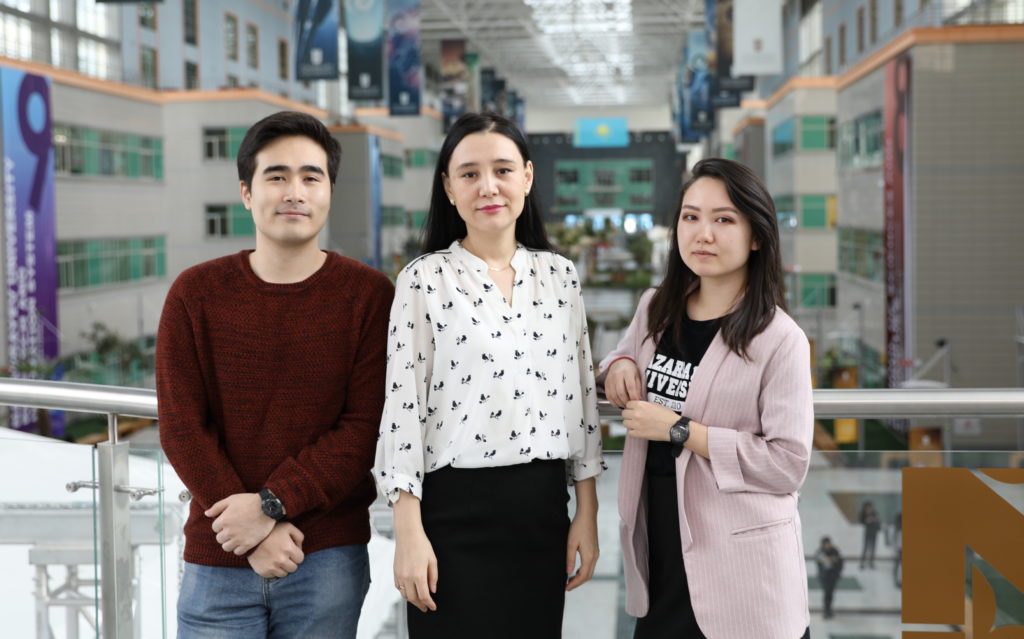NUR-SULTAN – Nazarbayev University (NU) scientists have developed CeliacTest, the first mobile application with a short questionnaire that can identify the risk of a person having coeliac disease, a genetically predisposed immune-mediated gluten intolerance. The creators want to increase the currently low awareness of the common disease that can lead to a severe health condition.
CeliacTest has no analogues, as it is the first app to complete the risk assessment, connect people with the disease and provide thorough information on gluten-free providers in Kazakhstan, said Aizhan Kozhakhmetova, a researcher, biology teaching assistant and the idea’s main developer, in an exclusive interview with The Astana Times.
She noted doctors and researchers “highly appreciated” and “have already expressed their interest in using the app in their research” after her presentation at Astana-Gastro 2019, the 14th international scientific and practical conference held Nov. 1-2 in the capital.
If a person is determined to be high-risk based on the questionnaire, the app provides recommendations for blood tests. People can gain comprehensive information on coeliac disease, related conditions, diagnosis and treatment.
Clinical scientists from the charity Coeliac UK composed the questionnaire for adults using evidence-based clinical guidelines and proved its accuracy. Kozhakhmetova, together with a team of Kazakh scientists, composed the list of queries for children.
The app is also useful for people diagnosed with the disease, as “strict compliance with the gluten-free diet is essential for the recovery and well-being of individuals with coeliac disease,” she said. The built-in directory makes it easy to find gluten-free restaurants and supermarkets in Kazakh cities, as well as information about doctors and medical centres. Users can also explore the app’s forum and gain access to an online medical consultant.
Kozhakhmetova has been involved in research on coeliac disease and its associated conditions for the last ten years. She learned disease awareness in Kazakhstan is minimal and there are no “coeliac associations or societies that would actively deal with this problem,” she said.
To create an organisation, Kozhakhmetova would need to devote most of her time to tackling bureaucratic procedures. In addition, even the existence of such a society “does not guarantee that all areas of our country will benefit from it,” she noted.
As a result, she devised a mobile app that eliminates the paperwork and accessibility problems “for everyone in Kazakhstan and even beyond,” she said.
“Through the CeliacTest app, I wanted to increase awareness about the condition and promote early diagnosis of coeliac disease, as well as support diagnosed people and foster further research,” she added.
NU computer science graduate students Nurdaulet Kenges and Korlan Zhumabekova volunteered to convert Kozhakhmetova’s idea into reality and made it available for free from the Play Store. The team worked on the app with enthusiasm and without funding.
The team will continue updating the glossary and list of medical professionals and services. It is currently only available in Russian, but they plan to add English and Kazakh versions. iOS users should expect to find the app in the Apple Store.
CeliacTest will also have a separate section for scientific news and publish information on new research findings, as well as material about on-going local and international research projects.
“I hope that this will increase the popularity of science among clinicians, as well as assist researchers to recruit patients into their research,” said Kozhakhmetova.
The project is seeking to promote the app through cooperation with medical professionals and healthcare organisations. The team may be contacted at [email protected].
The app is limited to a risk assessment. For an accurate diagnosis, one should see a doctor and take tests.
“The app gives a chance to those people with latent coeliac disease to be diagnosed [in a timely way] and start treatment earlier to avoid potential adverse consequences. Doctors can also use the app to assess the risks of their patients, which is the first step to accurate diagnosis,” she noted.
Early detection and prevention of coeliac disease can save a person from “gut mucosal layer atrophy and corruption of absorption of nutrients. Also, it can cause debilitating problems with bones, thyroid, skin and other organs,” said Kozhakhmetova.
“It is a quite common condition. Around one percent of the population suffers from it; however, it was estimated that about 90 percent of cases still remain undetected and it takes people eight years on average to get the right diagnosis. This happens because of its frequent atypical presentation and ability to mask [itself] under different symptoms and health conditions,” she added.


